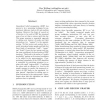Free Online Productivity Tools
i2Speak
i2Symbol
i2OCR
iTex2Img
iWeb2Print
iWeb2Shot
i2Type
iPdf2Split
iPdf2Merge
i2Bopomofo
i2Arabic
i2Style
i2Image
i2PDF
iLatex2Rtf
Sci2ools
119
click to vote
UAI
2004
2004
On the Choice of Regions for Generalized Belief Propagation
Generalized belief propagation (GBP) has proven to be a promising technique for approximate inference tasks in AI and machine learning. However, the choice of a good set of clusters to be used in GBP has remained more of an art then a science until this day. This paper proposes a sequential approach to adding new clusters of nodes and their interactions (i.e. "regions") to the approximation. We first review and analyze the recently introduced region graphs and find that three kinds of operations ("split", "merge" and "death") leave the free energy and (under some conditions) the fixed points of GBP invariant. This leads to the notion of "weakly irreducible" regions as the natural candidates to be added to the approximation. Computational complexity of the GBP algorithm is controlled by restricting attention to regions with small "region-width". Combining the above with an efficient (i.e. local in the graph) measure to predict...
Related Content
| Added | 31 Oct 2010 |
| Updated | 31 Oct 2010 |
| Type | Conference |
| Year | 2004 |
| Where | UAI |
| Authors | Max Welling |
Comments (0)

